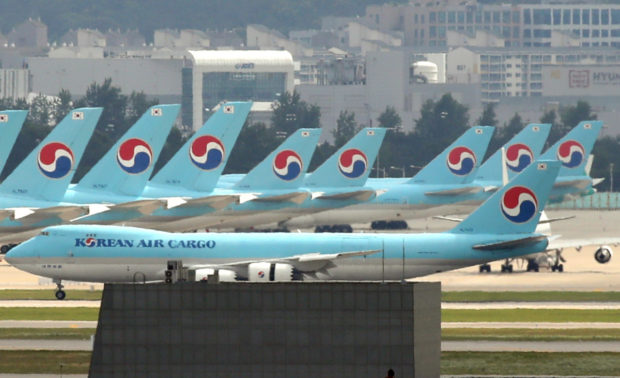Korean Air’s aircraft conversion plan approved
SEOUL — Korean Air Lines Co., South Korea’s biggest carrier, said Tuesday it will convert two of its passenger jets into cargo planes upon government approval to meet growing demand amid the coronavirus pandemic.
The Ministry of Land, Infrastructure and Transport has approved the national flag carrier’s request to convert two B777-300ER jets into cargo planes, a Korean Air spokeswoman said over the phone.
“The company may consider making another request to the ministry to convert additional passenger jets into cargo planes if cargo demand continues to rise amid the COVID-19 pandemic,” she said.
If there is an additional request from Korean Air for plane conversion, the government will review the request and approve it if the safety issues are guaranteed by manufacturer Boeing after conversion, a ministry official said.
The ministry said it will provide support for low-cost carriers if they want to carry cargo in their passenger jets under the aviation guidelines.
Asiana Airlines Inc., the country’s second-biggest carrier, said it is considering the plane conversion plan as it expects the virus outbreak could be prolonged for some time.
Cargo-carrying demand has jumped this year as more than 180 countries and territories closed their borders or imposed entry restrictions on incoming passengers amid virus fears.
Increased cargo demand helped airlines offset a sharp decline in air travel demand in the April-June quarter.
On a parent basis, Korean Air shifted to a net profit of 162.4 billion won ($137 million) in the second quarter from a net loss of 80.78 billion won a year earlier as it focused on obtaining more
cargo-carrying orders.
In June, Korean Air began to carry cargo in cargo seat bags, which attach to the seats of passenger jets, as the pandemic drove down travel demand and its earnings.
The move is in line with global airlines, which are now using their passenger planes for cargo flights, either by using cargo seat bags or removing seats.
Korean Air has a fleet of 143 passenger jets, including 26 B777-300ERs, and 23 cargo planes.
The carrier expects its overall cargo volumes will increase by at least 10 tons to 34 tons due to the conversion plan being approved.
Korean Air has suspended most of its flights on international routes since March, dealing a blow to its first-half bottom line.
From January to June, its consolidated net losses widened to 619.49 billion won from 482.01 billion won in the same period of last year.
In February, Korean Air’s parent company, Hanjin KAL Corp., came up with self-help measures, which include the sale of low-profit, non-core assets to focus on the mainstay airline and logistics business.
Korean Air had 70 percent of its 20,000-strong workforce take paid leave for six months starting April 16 as a measure to overcome the prolonged virus crisis.
Last month, it signed a deal to sell its mainstay in-flight catering and duty-free business to local private equity fund Hahn & Company for 990.6 billion won to secure operating capital. Yonhap
For more news about the novel coronavirus click here.
What you need to know about Coronavirus.
For more information on COVID-19, call the DOH Hotline: (02) 86517800 local 1149/1150.
The Inquirer Foundation supports our healthcare frontliners and is still accepting cash donations to be deposited at Banco de Oro (BDO) current account #007960018860 or donate through PayMaya using this link.
